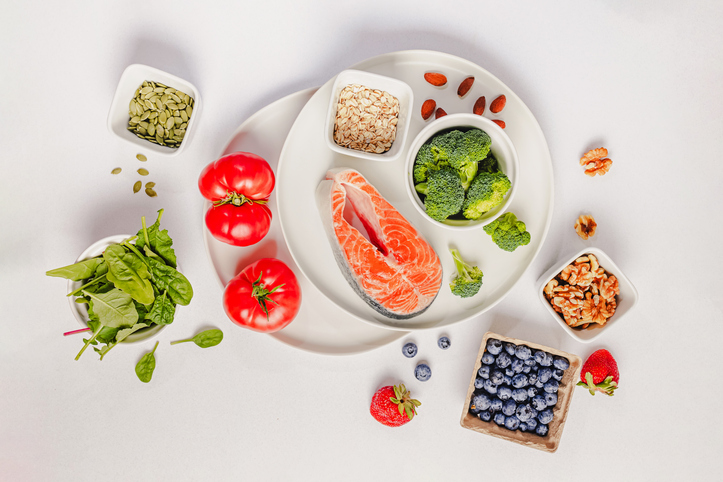Not Sure What Your New Year’s Resolutions Should Be? Here Are 9 Blue Zone Lifestyle Habits to Consider

By Joy Stephenson-Laws, JD, Founder
You might already be thinking of New Year’s resolutions. If you are, may I make a suggestion?
Adopt lifestyle habits to fight "inflammaging."What is “inflammaging?” In a nutshell, it is the culprit that fights the path to healthy and happy longevity.
If you regularly read pH blogs, you have seen that I constantly discuss chronic inflammation in Americans. Many in the health and wellness space refer to chronic inflammation as “inflammaging,” because it accelerates aging and promotes illness (thus making it more challenging to live a long and healthy life).
“Heart disease is the number one killer in America, and controlling inflammation is so intricately tied to how well we age that some researchers have nicknamed the damaging effects of inflammation on our bodies over time ‘inflammaging,’” according to this report from Insider that discusses lifestyle habits of people living in one of the world’s Blue Zones in Loma Linda, California.
(pH must-read - You May Not Live in One of the World’s 5 Blue Zones, But You Can Follow the Lifestyle)
There is a lot we can do to combat chronic inflammation. Following an anti-inflammatory diet instead of a pro-inflammatory diet is one of the most powerful actions you can take. To give you some perspective on how invaluable diet is, Harvard Medical School discussed a study published by the Journal of the American College of Cardiology (JACC) which discovered evidence exhibiting that people who mostly consumed a pro-inflammatory diet had a 38 percent higher risk of developing cardiovascular disease compared to those who followed an anti-inflammatory diet. Researchers of the study analyzed the diets of more than 200,000 men and women, and the time span of the study was up to 32 years.

- Dark Chocolate / Candy
- Sweet Potatoes / French Fries
- Salmon / Bacon
- Green Tea / Soda
- Avocado / Trans Fats
Generally speaking, anti-inflammatory foods are whole, unprocessed nutrient-dense foods, and pro-inflammatory foods are nutrient-void and processed and ultra-processed.
There are many other factors that can contribute to chronic inflammation, including:
- Drinking alcohol
- Smoking
- Being overweight or obese
- Chronic stress
- Poor sleep habits
Although fighting inflammation is no easy feat and the work never ends as long as we are alive, there is a lot within our control. Blue Zoners are great models for fighting “inflammaging.” This is why they are known for living to a healthy 100 and beyond. If you feel overwhelmed in the fight against chronic inflammation and perhaps being a healthier you in 2024, turn to the advice of Blue Zoners. The good news is that their methods are actually very simple, inexpensive and in some cases even enjoyable.
Earlier I mentioned this report from Insider. It discusses specific lifestyle habits of Seventh-day Adventists, a religious group largely based in Loma Linda, California - one of the world’s five Blue Zones.
I believe it is worth looking at these lifestyle habits and perhaps adopting them ourselves. These are habits that may greatly reduce chronic inflammation and protect heart health. Remember, heart disease is the leading cause of death for both American men and women.
“These people are not genetically spectacular. Rather, they believe in health, which helps them prioritize daily activities that draw down inflammation and improve circulation in the body,” Insider reports.
1. Eat mainly plant-based.
This does not mean adopting a vegan or vegetarian diet, however, they do not eat meat on a daily basis. Seventh-day Adventists follow a very veggie and bean-forward diet.
"By and large, they're only eating about three servings of both poultry and red meat per week," said Gary Fraser, a Loma Linda University Cardiologist, who was referenced in the Insider report.
If you eat meat, think about how much you eat on a daily basis. Perhaps you eat meat at every meal. Consider reducing your meat consumption. Check out these Meatless Monday pH blogs for some delicious food inspiration.
(pH must-read - What is “Reducetarianism,” and Should You Practice It?)
Although meat is a great source of protein and contains other essential nutrients such as vitamin B12 and iron, consuming too much of it has been linked to cardiovascular and other health issues. It is definitely advised to avoid processed meats such as bacon and salami and very little red meat.
“Research shows both processed and red meats are high in saturated fat, which causes inflammation,” reports the Cleveland Clinic.
“Studies have shown that higher intakes of these meats lead to cancer, heart disease and stroke, all of which go hand-in-hand with inflammation.”
2. Don’t forget those omega-3s.
Both the essential fatty acids omega-3 and omega-6 are indeed essential to our health. Our bodies do not produce these fatty acids, so we have to get them from food and/or supplements. An ideal diet would have a healthy balance of omega-3 and omega-6, but the modern American diet tends to be richer in omega-6. A major source of omega-6 is found in vegetable oils (which are very popular in the American diet). You may already know that fatty fish (such as salmon) are a great source of omega-3. Other sources include ground flaxseeds, chia seeds, walnuts, kale and spinach.
The benefits of omega-3 fatty acids include a reduced risk for heart attack and stroke, increased protection against Alzheimer’s disease, assisting in healthy neurological and eye development for fetuses and newborns, lower cholesterol and improvement in symptoms of rheumatoid arthritis. Research has shown that this fatty acid may even help with depression and other mood disorders.
(pH must-read - 5 Reasons You Need the Health Benefits of Omega 3s)
3. Be a social butterfly.
“Maintaining social ties helps your body control stress and counteract inflammation,” Insider reports.
Community is key. For example, research has shown that people who frequently attend church have lower stress levels. One study found evidence suggesting that people who attended church more than once a week had a 55% reduction of all-cause mortality risk compared to the people who did not attend church services.
Consider joining a pickleball team, golf group or a book club. Anything that brings you joy.

4. Meal prep with fresh foods in mind.
Maintaining an anti-inflammatory diet is work, but it is definitely worth it. Set yourself up for success by visiting your local farmer’s market, chopping up fresh fruits and veggies for the week and batch cooking healthy dishes such as black bean and lentil soup.
5. Drink water. Ditch soda and alcohol.
Almost a year ago I blogged about a study conducted by the National Institutes of Health (NIH) that found evidence strongly suggesting that not maintaining significant hydration increases the likelihood of aging faster, developing chronic diseases and an earlier death.
Soda and other sugar-sweetened beverages and alcohol are basically inflammation in a glass. Sugary drinks contribute to inflammatory conditions such as obesity and the development of type 2 diabetes. Alcohol has been linked to so many inflammatory diseases that the American Cancer Society recently updated their guidelines in cancer prevention to avoiding alcohol completely or drinking much less of it.
6. Rest and relax.
“Adventists often take a time out from the hustle and bustle of life every Saturday and head to church,” Insider reports.
“It's a tradition that's rooted in religion, but backed up by science too. Chronic stress is inflammatory, so taking time to relax and unplug really is good for keeping your body young.”
Here’s to more rest and relation in 2024!
7. Participate in a cooking class.
As mentioned, Seventh-day Adventists don’t eat much meat. If you are a daily or regular meat-eater, you might find it challenging to make plant-based meals to your liking. A cooking class can help with this and open you up to another world of healthy and delicious cooking and eating.
8. Spend time in nature.
Nature is one of the greatest “doctors” around for both physical and mental health. Even just a five minute walk can make a difference. Nature is so powerful that ocean therapy is believed to be very effective among many in the medical community.

9. Stretch.
I love this tip. Stretching is often overlooked but so key. There are so many benefits of stretching, especially as we age.
(pH must-read - Make Stretching a Part of Your Daily Routine: Your Mature Body Will Thank You!)
There is so much we can do to be proactive in the fight against chronic inflammation/“inflammaging.” Remember that the key is consistency not perfection. If I could add to the list above it would be to also take routine nutrient tests. Nutrient imbalance has been linked to an increase of inflammation. If the test reveals a deficiency or imbalance, a competent healthcare professional can work with you on making the necessary dietary changes and recommend quality supplements if necessary.
Let’s make 2024 our healthiest year yet!
Enjoy your healthy life!
Disclaimer: This article is not intended to provide medical advice. Please consult with your doctor or another competent healthcare practitioner to get specific medical advice for your situation.
The pH professional health care team includes recognized experts from a variety of health care and related disciplines, including physicians, attorneys, nutritionists, nurses, and certified fitness instructors. This team also includes the members of the pH Medical Advisory Board, which constantly monitors all pH programs, products, and services. To learn more about the pH Medical Advisory Board, click here.



